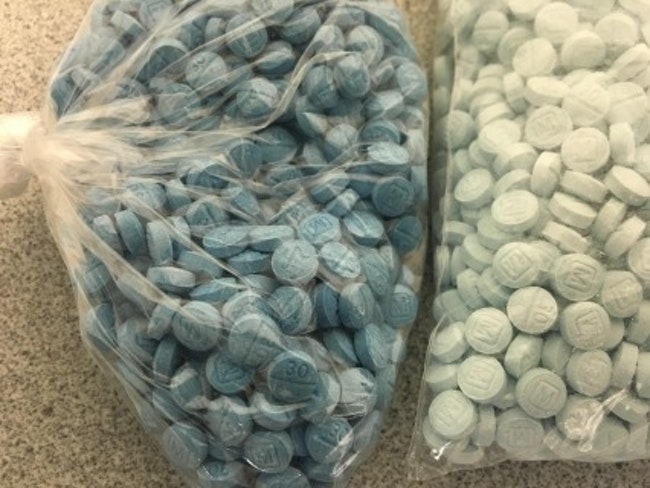One in three teenage Oregonians are unaware that fentanyl is being mixed with prescription drugs to make deadly fake pills, according to recently released data.
Meanwhile, just under half of teens and young adults in Oregon believe they are generally knowledgeable about fentanyl.
The new data comes from national nonprofit Song For Charlie and sheds new light on the public’s understanding of the deadly opioid across the state. The organization is named after Charlie Ternan, a 22-year-old man who died in 2020 in California after taking a counterfeit Percocet pill laced with fentanyl.
The organization recently expanded an online resource guide with an Oregon version intended to spur conversations among families.
“These conversations need to be brought into the home. It needs to happen at the kitchen table,” said Jennifer Epstein, a Beaverton mother who spearheaded the effort after her son Cal died in 2020 after taking a fentanyl-laced oxycodone pill.
READ IT: The data
Fentanyl is the leading cause of death for Americans ages 18-45, the U.S. Attorney’s Office said in a sentencing memorandum in the case of a 15-year-old Salem boy who fatally overdosed on a pill he bought that was mixed with the drug. Pills made with fentanyl and stamped “M30” are increasingly being sold as counterfeit prescription pills.
But the new data shows a disconnect in the conversations between parents and their children about fentanyl as the drug’s presence in Oregon has spiraled out of control in recent years.
The study surveyed 600 parents, 452 young adults and 300 teens in Oregon.
Around three in four parents reported they have talked to their child about the dangers of using prescription pills. But only two in five teens and young adults remembered having that conversation with their parents.
That indicates the message is not always getting through to teens and young adults, according to Epstein. Song for Charlie’s website, “The New Drug Talk,” is intended to provide families with information about fentanyl, experimental or self-medicating drug use, and advice on having effective conversations about drugs, alongside local resources.
Oregon lawmakers recently passed SB 238, which required schools to teach students about fentanyl starting this fall. But The New Drug Talk is focused on educating parents on how to prevent tragedy.
READ IT: Help for parents
Epstein said the death of her son made her realize how out of date her knowledge was.
“When we lost Cal, we had never heard about fentanyl,” she said. “We had taken both of our kids to the high school drug talk, which talked about marijuana and prescription pills and cocaine and heroin and the risks of all those. But there was no talk about fake pills made of fentanyl or fentanyl mentioned at all.”
Epstein said the rapid rise of fentanyl has made such conversations challenging for parents.
“Not all parents understand that the drug landscape is dramatically different than it was when we grew up,” she said. “We don’t really have an example, we don’t have role models to look back at as, ‘This is how we do the drug talk,’ and so that makes it an uncomfortable topic for parents.”
While fentanyl is the most common synthetic painkiller, it’s not the only one, according to Mark Stewart, a professor of psychology at Willamette University who teaches courses on drugs and serves on the advisory board for The New Drug Talk. Hearing about other deadly opioids such as carfentanil, sufentanil or xylazine can be overwhelming for parents who are just getting up to speed on fentanyl.
“That can also, I think, switch some people off or make them feel a little bit ill-informed,” he said. “Those of us that have parented kids, you don’t want to go into a conversation with your child feeling like you don’t have all the facts.”
Stewart said he sees the apparent disconnect between parents and children as an opportunity to raise awareness.
“They’re being sold poison,” he said of young people. “That’s not me coming in and judging and saying drug use is poison. I’m saying they’re getting contaminated pills, and as a result, people are dying.”
One approach Epstein recommended for parents is having an ongoing conversation with their children about what each of them are learning about fentanyl.
“Instead of making it a lecture, perhaps engaging in a conversation where both the parent and the child are learning together,” she said.
She also advised that parents help their children practice refusing drugs if offered as well as regularly checking in with them about their mental health.
While her son made a poor choice in taking what he thought was oxycodone, she said, his internet searches revealed he was researching safe ways to take the drug. She believes if Cal had known more about fentanyl, its dangers and how frequently it was being put in pills, he wouldn’t have reached for one.
About one-third of teens and young adults in Oregon personally know someone who was poisoned by fentanyl in fake pills or overdosed on prescription pills, according to the data.
Still, only three in five teens and young adults in the state believe that misusing prescription pills is a “highly serious issue,” the data showed.
The estimated lethal dose of fentanyl is about 2 milligrams, according to a July 2023 Salem police affidavit.
The Oregon Health Authority recorded 1,049 unintentional opioid overdose deaths in 2023, according to data published on April 25. Those numbers can still change as the agency awaits toxicology reports.
There are various challenges in putting a number to how many people are overdosing on fentanyl in Salem and elsewhere, according to Stewart.
People who overdose and are revived at the hospital have no obligation to give a urine sample Existing hospital data on overdoses is difficult to access. In fatal cases, investigations by medical examiners have been backlogged since the pandemic and can take months.
Stewart said those issues have resulted in the number of local fentanyl overdoses being undercounted.
Most young adults in Oregon don’t know where to get naxolone – better known by its brand name Narcan – which can reverse overdoses. Two in five don’t know how to use it, and almost half wouldn’t recognize signs of an overdose, according to the data.
Epstein said that while she would never condone taking a pill that’s not prescribed, the work she’s done since her son’s death made her realize that young people have gotten away with drug experimentation for generations.
“His behavior was not necessarily atypical for teenagers, but he just grew up in a time where that can’t happen anymore,” she said.
The data showed that three in four teens and over half of young adults reported they were less likely to take a pill without a prescription after they learned about the risks of fentanyl-laced counterfeit pills.
Epstein said that gives her hope. “The survey indicates that these conversations can actually change behavior in ways that can save a young person’s life,” she said.
Most teens who were surveyed reported that their parents and doctors were their preferred source of information about fentanyl and fake pills.
“The more conversations that parents can have, the more we can get this information to health care providers to have these conversations with their patients or their families, it’s going to help to reinforce any education that is provided in the schools,” Epstein said. “The more avenues that young people hear this, the safer our communities will be.”
Contact reporter Ardeshir Tabrizian: [email protected] or 503-929-3053.
SUPPORT OUR WORK – We depend on subscribers for resources to report on Salem with care and depth, fairness and accuracy. Subscribe today to get our daily newsletters and more. Click I want to subscribe!

Ardeshir Tabrizian has covered criminal justice and housing for Salem Reporter since September 2021. As an Oregon native, his award-winning watchdog journalism has traversed the state. He has done reporting for The Oregonian, Eugene Weekly and Malheur Enterprise.









